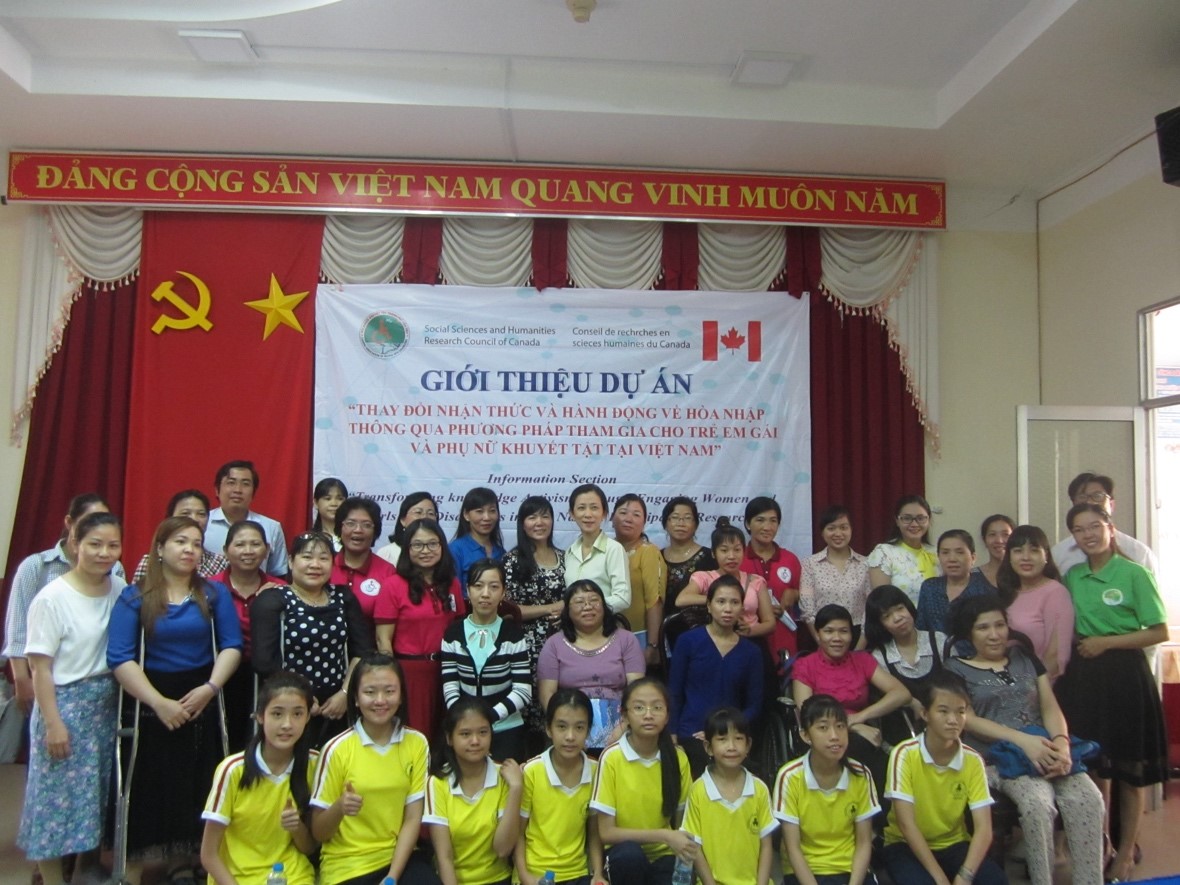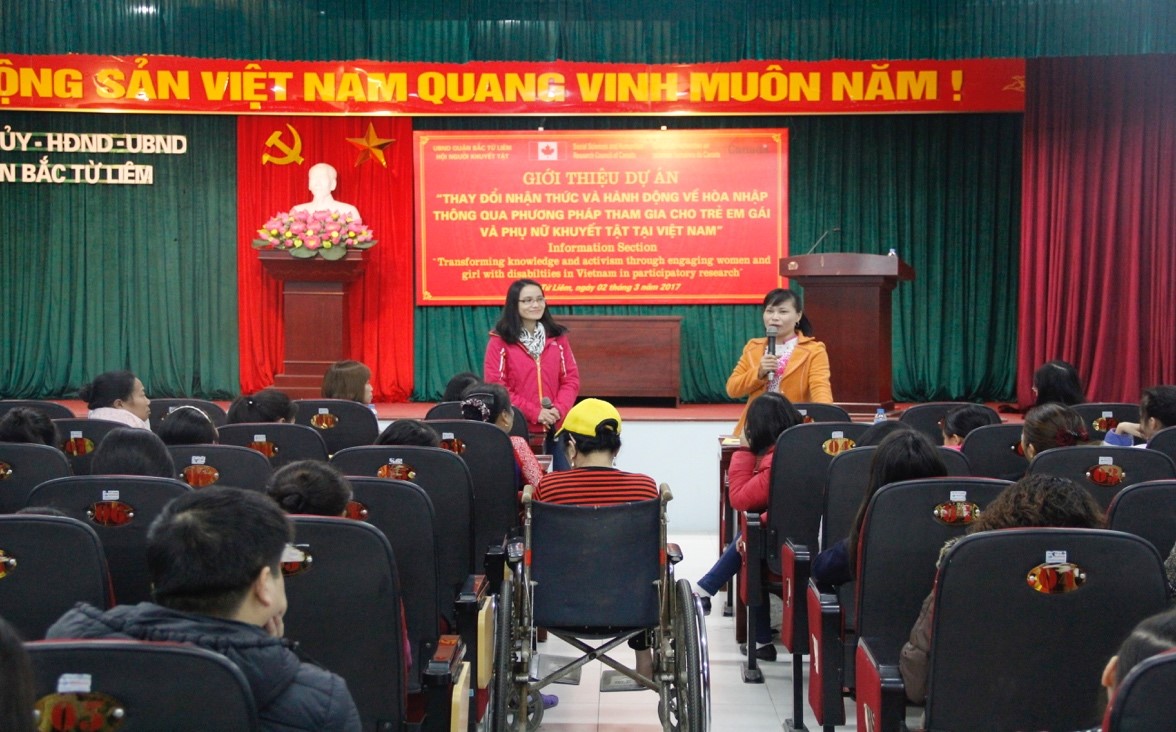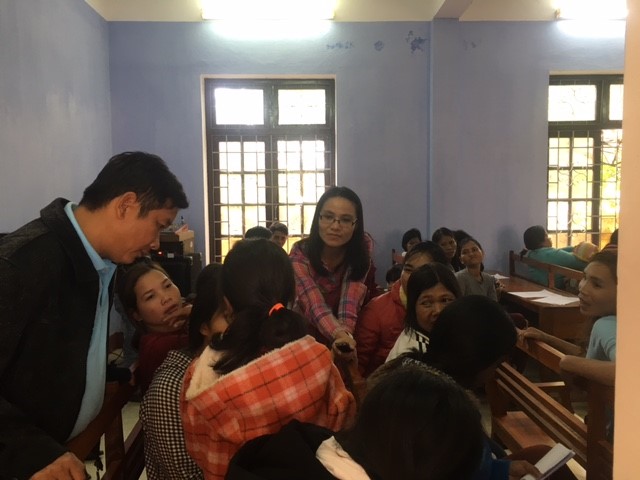illiterate
This past March and April, the TDKRA research team worked in collaboration with our local partners in Hanoi, Thua Thien Hue, and Can Tho City, and organized three information sessions.
Our objectives for these sessions were:
- To disseminate information regarding the TDKRA project to local communities (i.e: DPOs, parents of children with disabilities, women with disabilities’ club, schools etc.);
- To gain access to prospective participants (primarily women and girls with disabilities) who expressed their interest for this project;
- To develop a working relationship among project team members, local authorities (i.e: Department of Labour, Invalids and Social Affairs (DOLISA), Department of Education and Training (DOET), and the People’s Committee), and local organisations (i.e: Agent Orange Association).
Process
The first information session took place on March 2nd, 2017 in Bac Tu Liem People’s Committee headquarters. The second session was held on March 28th, 2017 in A Luoi. The final information session was held on April 11th, 2017 in Can Tho’s DPO office. Participants of these sessions included girls and women with disabilities, community members, local government officials, school representatives, parents of children with disabilities and DPOs.

Information session held in Can Tho, April 11, 2017.
Outcomes
Through these information sessions, which served as this project’s preliminary fieldwork, the research team was able to learn about a number of key concerns with relation to the community’s needs, as well as the needs of women and girls with disabilities. There was also a significant level of engagement from local communities, schools, and a number of organizations which was achieved through dialogue, which allowed for concerns to be expressed and information to be exchanged.

Mrs. Vuong Thi Luong is sharing her story in Bac Tu Liem’s information session.
Our observations from these information sessions are the following:
- The willingness of participants to be involved in the TDKRA project: Although the women and girls with disabilities had faced significant barriers to social participation, they also expressed enthusiasm in participating in the TDKRA project. For instance, a disabled woman in the Bac Tu Liem district identified as “illiterate” and had disclosed that she had dealt with bullies and experienced prejudice from the community where she lived in. Other girls and women with disabilities who had never before participated in any training or workshop were also eager to share their stories and take part in our training workshops.
- Diverse range of educational experiences: The girls and women with disabilities in the three communities had expressed a wide range of experiences with education. In Bac Tu Liem, a school official raised concerns regarding how schools could support people with disabilities and raise the community’s awareness of the rights of children with disabilities so that they can participate within their own communities. In contrast, access to education for girls and women was very limited in A Luoi. The major concerns were, however, aimed to make education accessible to the girls and women with disabilities, and discussed how their rights to education were protected. In Can Tho, a school representative expressed his concerns regarding discrimination against children with disabilities in education as well as the safety of children taking part in the TDKRA project. Furthermore, the lack of support from teachers and members of school board and authorities was also discussed.
- Participants’ Interest in the TDKRA project: Several participants had expressed their interest in being involved with the project in order to satisfy their educational needs. The participants were very excited about the use of drawing and photovoice through research activities, with the reason being that they never had a chance to go to school or had an opportunity to learn how to read or write prior to their education. One 20 year-old girl asked if she could participate in the training with her intellectual disability. This shows a sense of enthusiasm from participants who expressed their needs for education.

With the assistance of an interpreter, a 20 year-old- girl in A Luoi is expressing interest in participating in the project.
- The impact of the MRGD project on women with disabilities: We also observed that the MRGD project has had a positive impact on the lives of women with disabilities who had participated as trainees. One woman who previously participated in the pilot project shared how the training changed her life. Specifically, she talked about being able to overcome the obstacles of discrimination and prejudices against women with disabilities in her community.
- Inquiries of women with disabilities with the potential of this project transforming their lives: Although this was not the project’s objective, we found that we were able to engage with the concerns raised by women with disabilities in relation to poverty and development issues.
- Developing a working relationship with local authorities: The information sessions were a chance for the TDKRA team to build relationships with not only DPOs, but also with local authorities and government officers from DOLISA (Department of Labour, Invalids and Social Affairs), DOET (Department of Education and Training) and Agent Orange Victims Associations. They participated in the meetings, had speeches, shared their positive thoughts on the project and expected to have more trainings in the future.
- Developing a working relationship with local communities: The information sessions were warmly welcomed by parents of children with disabilities, women with disabilities’ clubs and local schools. Parents expressed their willingness to let their children participate in the training, however they also expected to have some soft skills for their girls. Women with disabilities’ clubs showed their sympathy and strong cooperation in the sessions by disseminating and circulating the information among their teams. They also encouraged their members to take part in the training to empower their capacities.